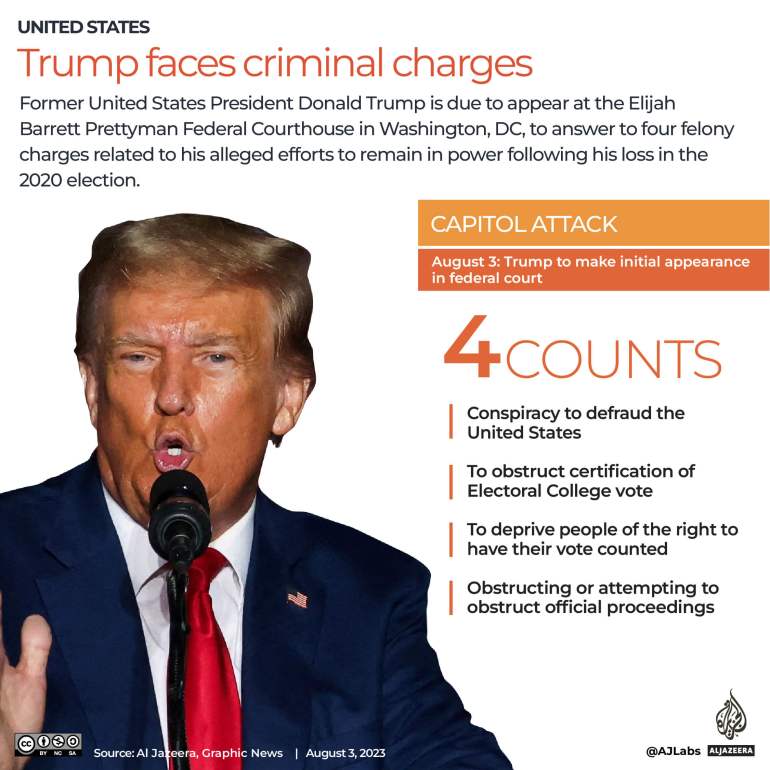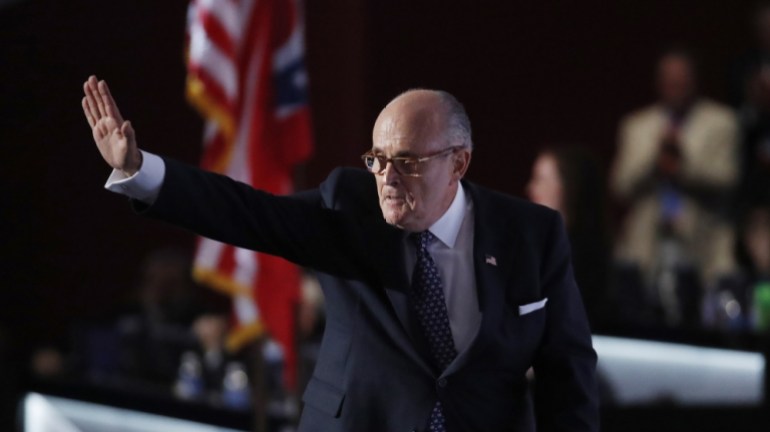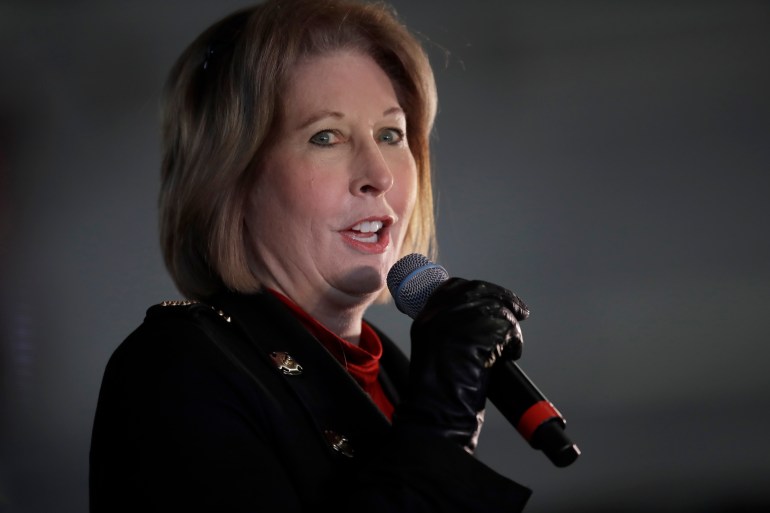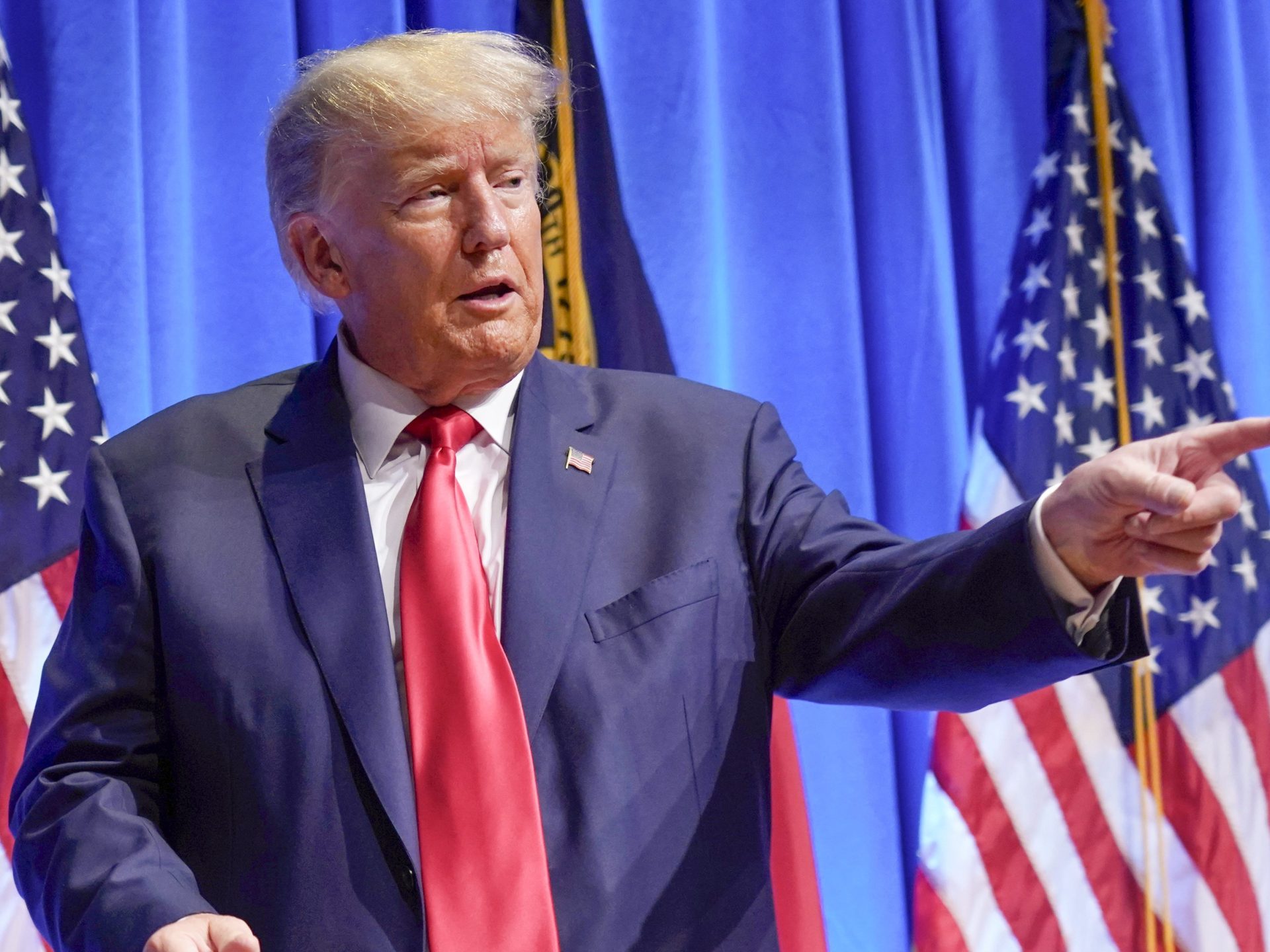Trump’s indictment: Who are the six co-conspirators in 2020 election probe? | Donald Trump News
Former United States President Donald Trump has been criminally indicted for plotting to overturn the results of the 2020 presidential election to cling on to power.
His third criminal indictment since March, filed on Tuesday by Special Counsel Jack Smith, detailed how the Republican attempted to obstruct “a bedrock function” of democracy and sought to reverse his loss to Democrat Joe Biden.
While Smith placed the blame for the violent assault on the US Capitol on January 6, 2021, squarely on Trump’s shoulders, prosecutors alleged that he did not act alone.

Six alleged accomplices were identified as “co-conspirators” by the US Department of Justice for assisting Trump with everything from fomenting the crowd that stormed the seat of the United States Congress to intimidating state legislators and spreading false claims of supposed electoral fraud.
These accomplices have yet to be named as they have not been formally charged. However, the detailed description in the indictment regarding their involvement made it possible to identify some of the likely suspects.
Here is what you need to know about the possible accomplices and their alleged involvement:
Rudy Giuliani
The former New York mayor, presidential candidate, and member of the former president’s legal team have admitted to being involved in the litigation.
His actions match those attributed to “Co-conspirator 1”, described in the indictment as “an attorney who was willing to spread knowingly false claims and pursue strategies that the defendant’s 2020 reelection campaign attorneys would not”.
He is alleged to have played a prominent role in spreading unfounded claims of election fraud in the aftermath of the election when he held rallies in key battleground states that Trump lost.
After the indictment was released, Giuliani posted a 185-minute live video on the social media platform X – formerly known as Twitter – calling the charges a “nothing burger” and defending his rallies under the First Amendment right to free speech.

John Eastman
Law professor John Eastman was identified as the second co-conspirator for allegedly attempting to provide a legal basis for Trump’s claim of electoral fraud by manipulating the count of electors to the Electoral College.
According to the indictment, he “devised and attempted to implement a strategy to leverage the Vice President’s ceremonial role overseeing the certification proceeding to obstruct the certification of the presidential election”.
He is also thought to have suggested pressuring former Vice President Michael Pence into either disrupting or delaying the certification process.
Eastman’s lawyer Charles Burnham said the indictment used a “misleading presentation of the record to contrive criminal charges against Presidential candidate Trump and to cast ominous aspersions on his close advisors”.
Sidney Powell
Trump’s political adviser Sidney Powell, or “Co-conspirator 3”, is alleged to have spread disinformation, claiming “massive election fraud”.
She is described in the indictment as “an attorney whose unfounded claims of election fraud the Defendant [Trump] privately acknowledged to others sounded ‘crazy’”, yet “embraced and publicly amplified”.
The former federal prosecutor is best known for the catchphrase “release the Kraken”, widely shared after appearing on Twitter. The reference to the 1981 movie The Clash of the Titans, in which Zeus gives the order to release a mythical sea monster, was used to signal an election fraud conspiracy on social media.
In testimony to the congressional committee examining the January 6 riot, Powell said “no reasonable person” would view her many claims of election fraud as fact.

Jeffrey Clark
“Co-conspirator 4” is described by prosecutors as a Department of Justice (DOJ) lawyer who tried to “use the Justice Department to open sham election crime investigations and influence state legislatures with knowingly false claims of election fraud”.
Former senior Justice Department officials testified about efforts by Clark to support Trump’s bogus claims of voter fraud, including a proposal to send a letter to officials in key states saying the Justice Department had “identified significant concerns” about the vote.
His actions led to a confrontation at the White House on January 3, 2021, when senior Justice Department officials told Trump they would resign if he appointed Clark to replace attorney-general Jeffrey Rosen, who was refusing to back the fraud claims.
Kenneth Chesebro
“Co-conspirator 5” was a lawyer who “assisted in devising and attempting to implement a plan to submit fraudulent slates of presidential electors to obstruct the certification proceeding”.
He is alleged to have devised a plan to send in fake electoral votes to Pence so that an objection could be raised in Congress that such votes should be counted.
While there are no records of Chesebro ever being paid for his work, he has argued that his communications with the Trump campaign were protected by attorney-client privilege.
Unnamed political consultant
The identity of the sixth co-conspirator remains unclear. They are described in the indictment as a “political consultant who helped implement a plan to submit fraudulent slates of presidential electors to obstruct the certification proceeding”.
The person is said to have participated in a conference call about the efforts to overturn the 2020 presidential election results in Pennsylvania.
On the night of January 6, they looked for senators’ phone numbers for Giuliani to call to delay certifying the electoral votes.

